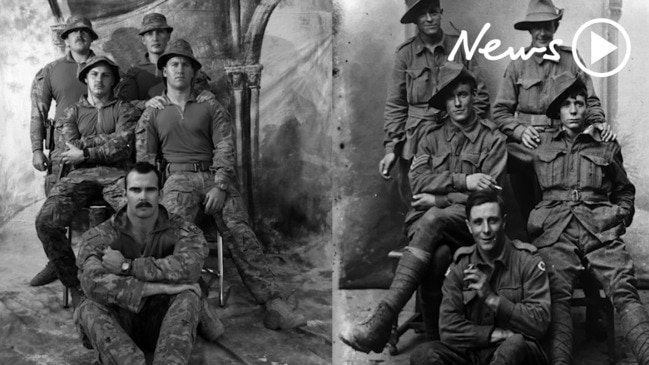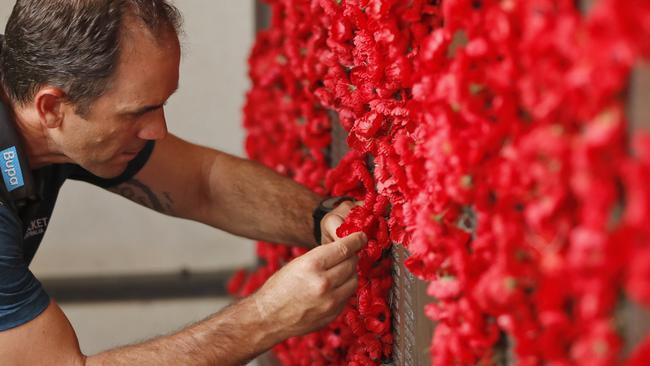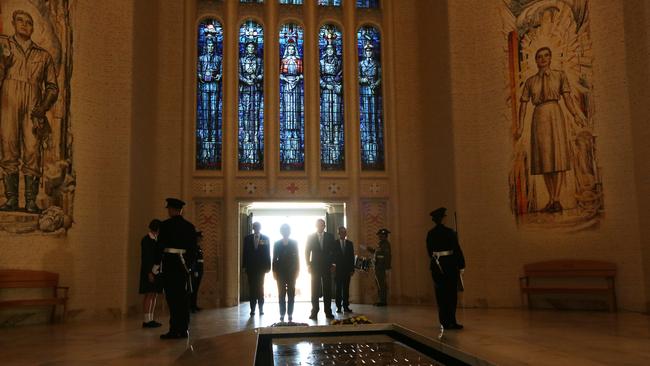Our sacred place must be protected at any cost
Patriotism, fortitude, loyalty, and sacrifice, may be unfashionable virtues in 2019, there is no hope for the nation that discards them and dishonours its heroes, writes Gray Connolly.

Rendezview
Don't miss out on the headlines from Rendezview. Followed categories will be added to My News.
The Australian War Memorial in Canberra is, as the historian Ken Inglis titled his book about the nation’s war memorials, a ‘sacred place’.
The War Memorial opened in 1941 to commemorate Australia’s sacrifices in what was then called Great War, albeit the opening occurred during the darkest days of the Second World War. The great chronicler of the Australian war effort in the First World War, CEW Bean, said of the War Memorial, “Here is their spirit, in the heart of the land they loved; and here we guard the record which they themselves made.”
Yet as was true then, as is true now, Australians were building a further and better war record. The War Memorial was intended to be not just a memorial but a repository of war memories and artefacts, for an Australian people who had lost enormous numbers of fathers, sons, and daughters, fighting in often distant lands for the security of home. The War Memorial fulfilled a particularly important healing purpose, given that, until only recently, few Australians would ever be able to travel to visit their relative’s war graves. The War Memorial did not just list the valiant dead’s names but also explained and displayed, tastefully and understatedly, what their sacrifice meant for Australia’s war history.
RELATED: Why we should say ‘thanks for serving’ more often
While there is room in the Australian identity for everyone, it is hard to think of any national phenomenon with the staying power of Anzac. In 2015 alone, more than 1 million people visited the War Memorial. Australians’ interest in their wartime history, as Sydney University’s Peter Cochrane noted, has only grown, spurring publishing interest in Anzacs of all ethnic and religious backgrounds (indigenous and Jewish Anzacs, for example), as well as military genealogy. More Australians understand the nation’s wartime experience through the archival evidence of their own family’s service.

Yet, even so, the militia of ‘cultural dietitians’, as John Howard called them, have been digging in for some time against the War Memorial. Despite this history, as Dr Mervyn Bendle pointed out, there is a persistent view that sees the “Anzac legend as a propaganda tool of manipulation” rather than a source of national belonging. Given the Anzac legend’s centrality to the War Memorial, it, too, has seen its share of adversaries. In the 1960s and 1970s, Anzac Day itself declined, a response to divisions over the Vietnam War and critical works like the play, The One Day of the Year. The left-wing’s need to denigrate national history is part of a bigger ideological campaign for what 18th century French revolutionaries called ‘year zero’. In order for a political insurgency to win, the nation’s traditions and institutions, not just its laws, must be discarded. That we Australians have inherited a nation and a constitutional order that earlier generations of Australians have fought for, and which today’s Anzacs also fight for, and which we are all entrusted to keep and defend, is anathema to this woke intifada.
RELATED: I’m tired of people trying to make me feel guilty about our history
In 2013, there was a campaign to remove “Known unto God” from the War Memorial’s tomb of the Unknown Soldier. When this secularist putsch was exposed, it was repulsed, but only after a public outcry. More recently, the ABC’s Triple J tried to stir-up outrage that armaments companies were sponsoring the War Memorial, as if this was some moral quandary for a building housing rifles, pistols, artillery, tanks, fighters, helicopters, and bombers. And now, in 2019, the New York Times, left-wing America’s broadsheet, has tried to ambush our own War Memorial. The Times has claimed, contradictorily, that the War Memorial’s exhibits have been both expanded to focus on the Afghanistan and Iraq wars but this has also, somehow, sanitised those wars’ histories.

Australia is not alone in experiencing attacks on its war history. In 2014, the British education secretary, Michael Gove, reformed the history curriculums and attacked the decades-long propagation of the myths of Blackadder and left-wing history, saying, rightly, that the First World War was justly fought. In the United States, meanwhile, there will soon be a Supreme Court hearing concerning Maryland’s “peace cross”, a large cross erected in 1925 to commemorate America’s First World War dead. This cross was built on what was once private land but which, over time, became state land — and the political Left argues the peace cross violates the separation of church and state!
RELATED: These photos are difficult to look at, but they are the reason we went to war
The idea of a national history, especially a military one, that we all share through a common citizenship, is under attack from an identity politics that is, fundamentally, ashamed of Australia. That we may have bonds and duties between and across Australian generations is alien to the hyper individualism of today. The Australian Defence Force is justly well-known for its mateship and camaraderie, and its capacity to take people from all places, faiths, and ethnicities, and weld them together as a fighting team. Ongoing skirmishes over the War Memorial are mere proxies for a battle over what we remember and honour as Australians.
The War Memorial is a living testament to the many generations of Australians who fought to defend our country and who did so without qualification and without apology. While patriotism, fortitude, loyalty, and sacrifice, may be unfashionable virtues in 2019, there is no hope for the nation that discards them and dishonours its heroes.
Gray Connolly is a barrister and writer. He served as a naval officer on operational deployments in the Middle East and Asia.


